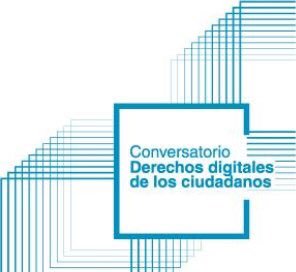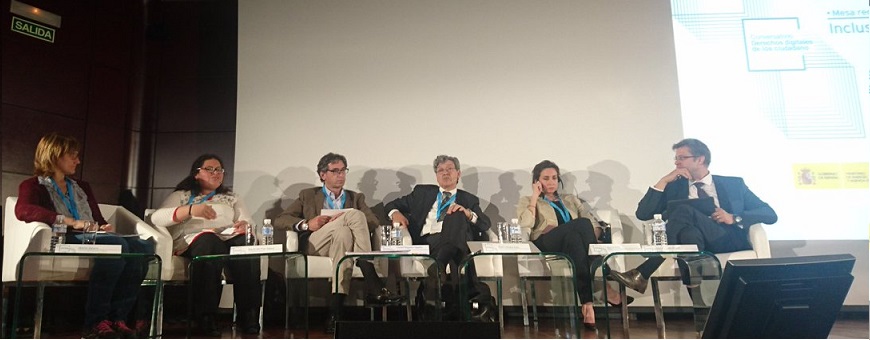The digital transformation is radically and rapidly changing the world we live in. As society attempts to adapt to these changes, it must do so in such a way that citizens are able to conserve the rights they already have in the digital world. In order to address this issue, on Tuesday, May 30, the first Discussion on Citizens’ Digital Rights took place in the Nouvel Building, in Reina Sofía Museum in Madrid.
 The event was organised by the group of experts on citizens’ digital rights formed last March through the National Observatory on Telecommunications and Information Society (Observatorio Nacional de las Telecomunicaciones y de la Sociedad de la Información, or ONTSI) part of Red.es. The event brought together representatives of civil society, academia, the political and the business world in order to ensure the presence of all points of view on where new regulations adapted to the changing digital reality should head.
The event was organised by the group of experts on citizens’ digital rights formed last March through the National Observatory on Telecommunications and Information Society (Observatorio Nacional de las Telecomunicaciones y de la Sociedad de la Información, or ONTSI) part of Red.es. The event brought together representatives of civil society, academia, the political and the business world in order to ensure the presence of all points of view on where new regulations adapted to the changing digital reality should head.
The Discussion was inaugurated by José María Lasalle, Secretary of State for the information society and Digital Agenda, who defended the need to listen to everyone involved in the “great challenges facing society today, with this new digital reality.” In addition, the Secretary of State added the need to “invest in a fifth generation of rights in the world of 5G.”
After Lasalle’s intervention, the Professors of Administrative Law José Luís Piñar and Tomás de la Quadra-Salcedo debated on new technologies and their influence on our society, beginning with a reflection by Stefano Rodotá, the instigator of the Italian Declaration of Internet Rights.
The first of the round table discussions on “Challenges of technological advances” included talks by representatives from companies involved in digital innovation, such as Stephen Deadman, of Facebook; Chema Alonso, Chief Data Officer at Telefónica; Shelley McKinley from Microsoft Europe; Marisa Jiménez, of Google, and Jean-Jacques Sahel, Vice President in Europe for ICANN. Speakers described the advantages of developing technology and its influence on the lives of citizens, also presenting the point of view of each of their companies on these issues.
In representation of Telefónica, Chema Alonso spoke about the capacities of technological advances like big data or artificial intelligence, emphasizing “the great effort to increase connectivity” made by Telefónica in order to “improve people’s lives” through these technologies. Stephen Deadman, as Facebook’s representative, emphasized the importance that “the industry, governments and civil society work together to develop Digital Rights”.
As an example, Chema Alonso spoke about the fourth platform that will soon be launched by Telefónica and Aura, its artificial intelligence system, which will allow the company “to give customers control over their own data” and “the ability to decide how [this data] can improve their lives.”
In the round table discussion “Digital inclusion and diversity”, moderated by Christoph Steck, Director of Public Policies at Telefónica, the need to adapt society to get the most out of new technology was discussed. 47% of the world population uses the internet. In view of this information, Christoph Steck asked speakers how to eliminate the digital divide and offer all the improvements the internet can bring to societies and their economy.

The participants of the round table about “Digital inclusion and diversity”
Raúl Katz, Professor at the University of Colombia, indicated access, the need for information aimed at digital literacy and the lack of culturally relevant content for certain societies as causes of the digital divide. Professor Katz added that “there is plenty of Internet use, but no applications to improve the efficiency of societies.” He also noted the importance of education in converting internet access into a tool to improve the development of societies. Pilar Sáens, from the Karisma Foundation, indicated the importance of “not just improving connectivity”. “There are other barriers, both economic and legal” that halt digital inclusion, stated to Sáenz.
The event included other debate forums on subjects like “Globalisation and democracy”, in which international representatives such as Bertrand de la Chapelle, from Internet & Jurisdiction, or Andrew Puddephatt, from Global Partners Digital, spoke of the importance of taking on the new contributions of the digital world, and their influence on the rights of citizens from an international point of view. Another round table involving members of civil society concentrated on the impact of new technologies on freedom of expression and privacy, and what formulas should be used to guarantee these fundamental rights.
The first Discussion on Digital Rights is the result of the regular meetings of the members of the Working Group on Citizens’ Digital Rights made up by José Luis Piñar, Professor of Administrative Law at CEU-San Pablo University; Tomás de la Quadra-Salcedo, Professor of Administrative Law at Carlos III University; Christoph Steck, Director of Public Policies at Telefónica; Ricard Martínez, Director of the Microsoft Professorship of Privacy and Digital Transformation; Diego Naranjo, Senior Policy Advisor at the European Digital Rights Association; Miguel Pérez Subías, President of the Asociación de Usuarios de Internet (Internet Users’ Association); and Ofelia Tejerina, Secretary of the Asociación de Internautas (Association of Internauts).
The group of experts is expected to meet periodically throughout 2017 with three fundamental tasks: prepare a diagnosis of the current situation regarding the protection of the rights and obligations of citizens; promote a neutral, transparent, open, and informed debate about digital rights; and contribute to the European agenda in this matter.






